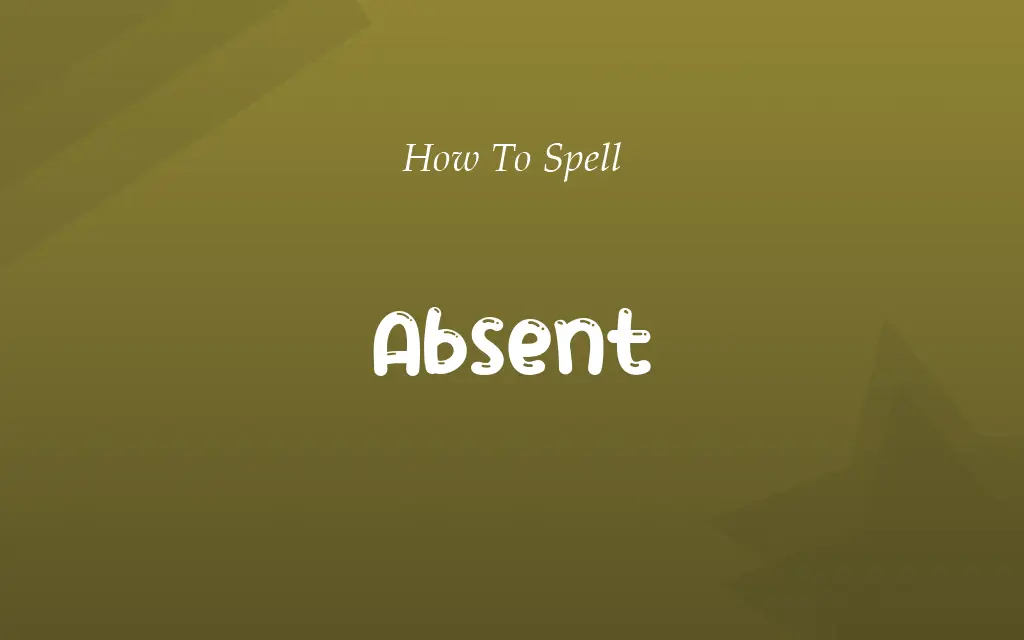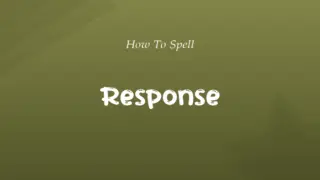Abscent or Absent: The Correct Spellings
Edited by Muazma Batool — By Muneeza Rehman — Published on March 19, 2024
Abscent is incorrect. The correct spelling is absent, which means not present in a place, at an occasion, or as part of something.

Which is correct: Abscent or Absent
How to spell Absent?
Abscent
Abscent

Absent
Absent

Is it Abscent or Absent
While abscent might be mistaken as a word, it’s important to recognize that absent is the only correct form. This word can take different forms depending on its grammatical use, including absenting (present participle), absented (simple past), and absentees (noun form), although these variants are not as commonly used as the adjective form.
Muneeza Rehman
Mar 19, 2024
The word absent derives from the Latin word "absens," the present participle of "abesse," meaning "to be away, be absent." In contrast, abscent is a common misspelling and does not have historical roots or meaning in the English language.
Muneeza Rehman
Mar 19, 2024
To remember the correct spelling of absent, one might think of the phrase "A sent letter is not present," linking the "sent" in absent to something gone, hence not present.
Muazma Batool
Mar 19, 2024
How Do You Spell Absent Correctly?
Incorrect: The key was abscent from its usual spot.
Correct: The key was absent from its usual spot.
Muazma Batool
Mar 19, 2024
Incorrect: The usual noise was abscent in the empty streets.
Correct: The usual noise was absent in the empty streets.
Mark
Mar 19, 2024
Incorrect: The teacher noticed that two students were abscent.
Correct: The teacher noticed that two students were absent.
Mark
Mar 19, 2024
Incorrect: He was abscent from school today. (incorrect)
Correct: He was absent from school today. (correct)
Muneeza Rehman
Mar 19, 2024
Incorrect: Her name was abscent on the list.
Correct: Her name was absent on the list.
Muneeza Rehman
Mar 19, 2024
Absent Definitions
Not attentive; preoccupied.
He had an absent expression during the lecture.
Muneeza Rehman
Jan 31, 2024
Absent Meaning in a Sentence
She remained absent from social media after the incident.
Emilio
Mar 19, 2024
The flavor is absent in this recipe.
Muneeza Rehman
Mar 19, 2024
The teacher is often absent on Mondays.
Muneeza Rehman
Mar 19, 2024
Her father has been absent for most of her life.
Muneeza Rehman
Mar 19, 2024
His attention was absent during the discussion.
Muazma Batool
Mar 19, 2024
The sun was absent from the sky, hidden by clouds.
Daniel
Mar 19, 2024
The character of the villain is absent in this adaptation.
Victor
Mar 19, 2024
Her approval was notably absent from the proceedings.
Victor
Mar 19, 2024
The usual crowd was absent from the café.
Tony
Mar 19, 2024
His signature is absent from the document.
Tony
Mar 19, 2024
Absent Idioms
Absent oneself
To choose not to attend or participate.
She decided to absent herself from the discussion.
Muneeza Rehman
Mar 19, 2024
Absent in body, but present in spirit
Not physically present but feeling participation or involvement.
Though absent in body, she was very much present in spirit at the ceremony.
Muneeza Rehman
Mar 19, 2024
Absent in thought
Distracted or preoccupied, not paying attention.
He seemed absent in thought during the entire meeting.
Muneeza Rehman
Mar 19, 2024
Absent from duty
Not present at one's place of work.
The guard was absent from duty when the incident occurred.
Mark
Mar 19, 2024
No one absent, all present
Everyone is present, no one is missing.
The roll call showed no one absent, all present.
Tony
Mar 19, 2024
Absent from the record
Not included in the official documentation or minutes.
His statement was absent from the record, though he definitely spoke.
Stacy
Mar 19, 2024
Absent without leave
Away without permission or explanation.
He was absent without leave from his post, which caused concern.
Muneeza Rehman
Mar 19, 2024
Marked absent
Recorded as not present.
She was marked absent in the register despite being in class.
Tony
Mar 19, 2024
Absent-minded
Forgetful or inattentive due to preoccupation.
The professor is brilliant but somewhat absent-minded.
Muneeza Rehman
Mar 19, 2024
Absent by design
Intentionally not present.
He was absent by design to avoid the confrontation.
Muazma Batool
Mar 19, 2024
Frequently Asked Questions
What part of speech is "absent"?
"Absent" can be an adjective, verb, or noun depending on its use in a sentence.
Muazma Batool
Mar 19, 2024
Why is "absent" spelled without a 'c'?
"Absent" is derived from Latin, where it is spelled without a 'c'. The correct spelling reflects its Latin origin.
Muneeza Rehman
Mar 19, 2024
How can I remember the spelling of "absent"?
Think of "A sent letter is not present," linking the "sent" in absent to something gone, hence not present.
Mark
Mar 19, 2024
Does "absent" have a noun form?
Yes, the noun form is "absentee," referring to a person who is absent, especially from work or school.
Victor
Mar 19, 2024
What is the origin of the word "absent"?
"Absent" originates from the Latin word "absens," meaning "to be away, be absent."
Muneeza Rehman
Mar 19, 2024
How do you use "absent" in a sentence?
As an adjective: "He was absent from the meeting." As a verb: "He will absent himself from the discussion." As a noun: "The list of absentees was long."
Muneeza Rehman
Mar 19, 2024
Are there any synonyms for "absent"?
Yes, synonyms include "away," "missing," "gone," "nonexistent," and "lacking."
Carlos
Mar 19, 2024
Content Creators
Written by
Muneeza RehmanAt Spellings wiki, Muneeza stands as a beacon of accuracy and precision, championing the importance of correct spellings in the written word.
Edited by
Muazma BatoolMuazma is a dedicated writer for Spellings.Wiki. Passionate about the intricacies of English spellings and etymology, she simplifies complex language elements for her global audience. Beyond her work, Muazma stays updated on language trends by participating in workshops and conferences. An avid reader and traveler, she enjoys exploring cultures and languages during her leisure time.



























